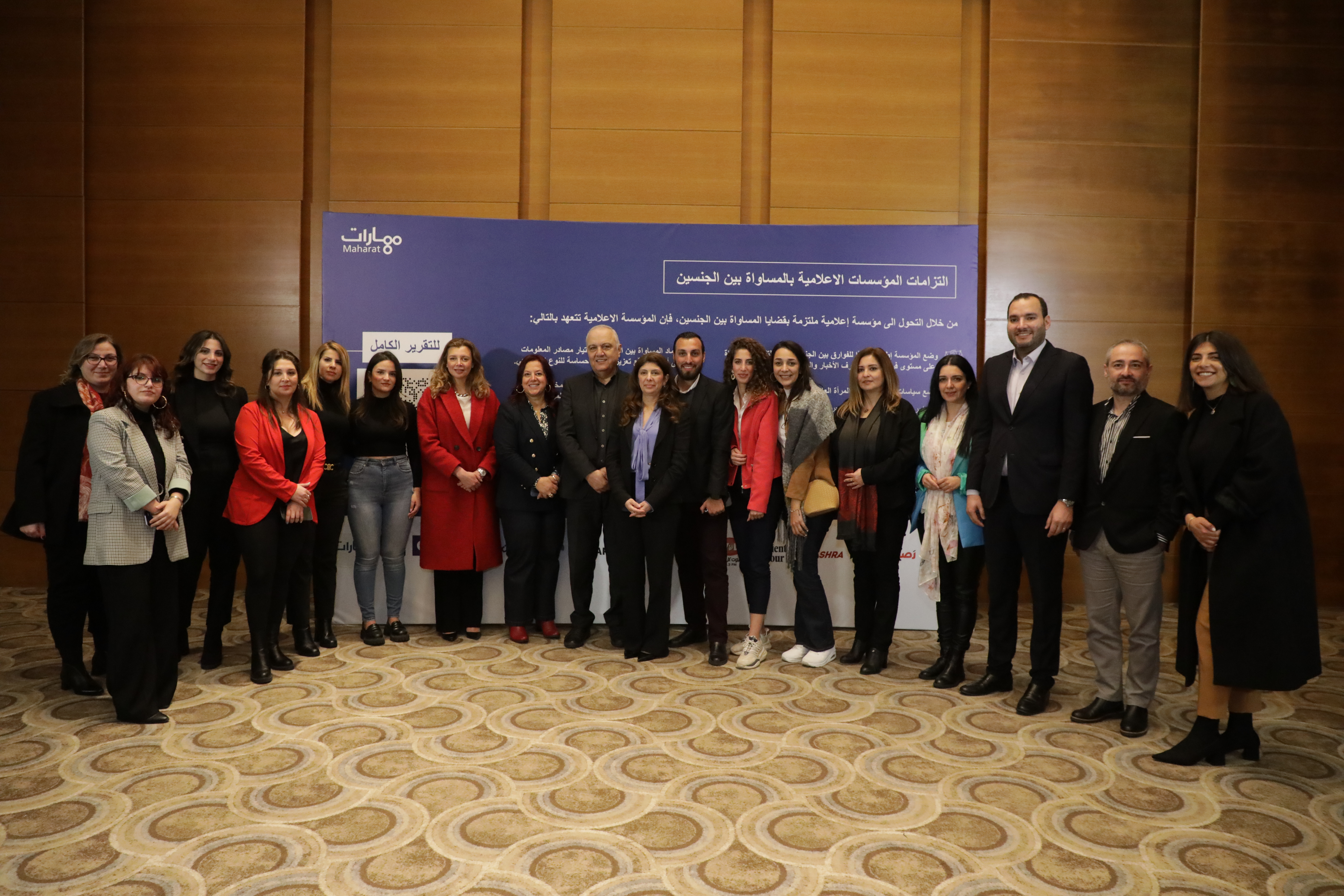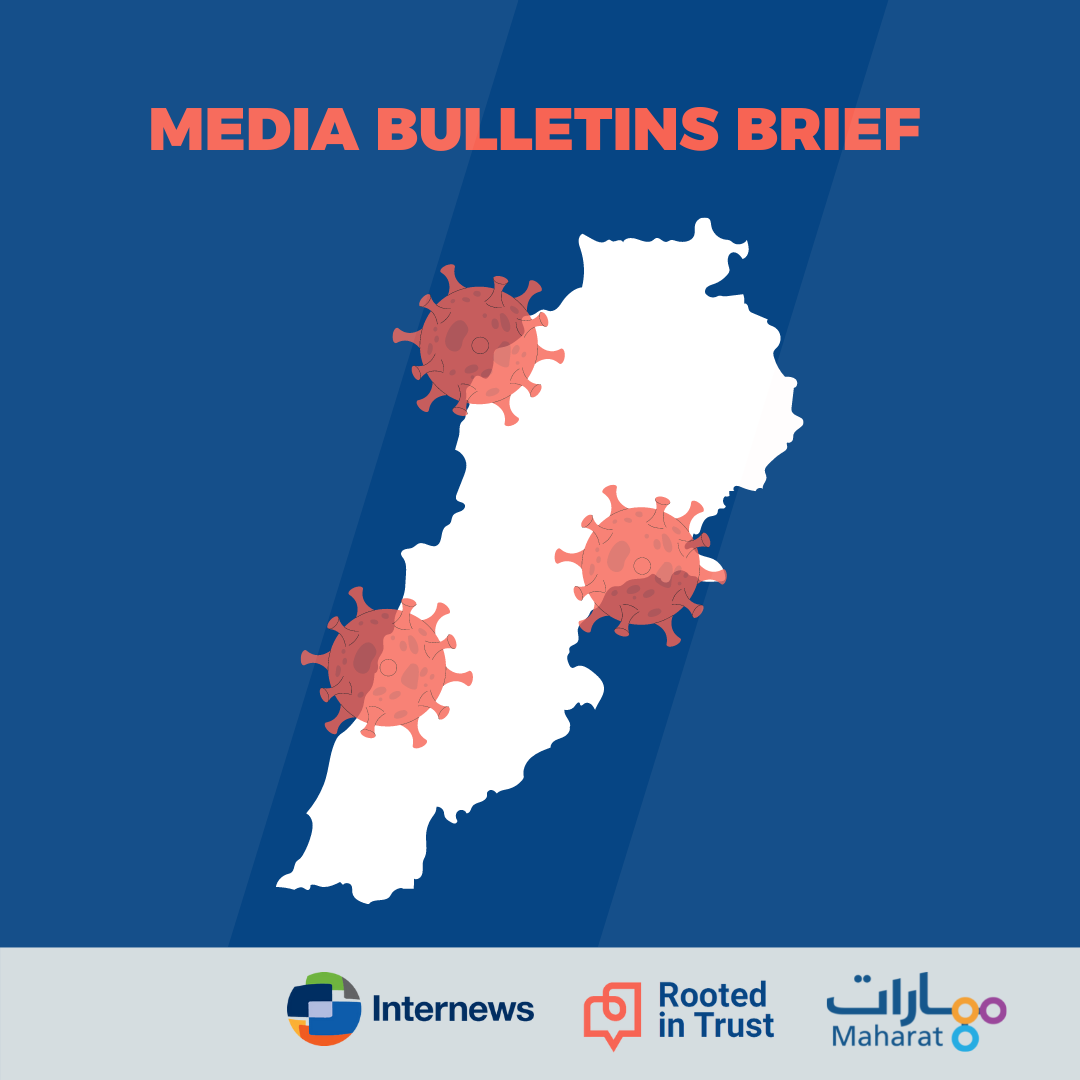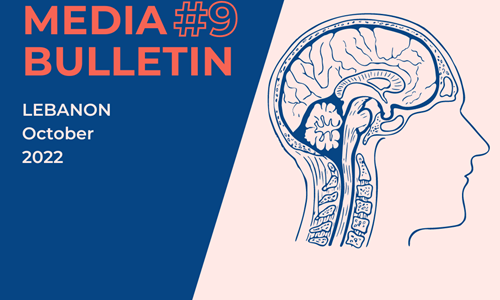
Event on "Media and Promoting Gender Equality"
As part of the "Gender Champions Media Initiative" project, undertaken by the Maharat Foundation in partnership with UN Women and the British Embassy in Beirut, Maharat Foundation organized an event titled "Media and Promoting Gender Equality" on March 20, 2024, as a culminating activity of the project. The event was attended by a group of journalists, representatives from political parties, activists, experts in various fields, and civil society organizations working to promote women's rights and gender equality, especially those advancing women's participation in public life.
The meeting started with opening remarks from the Maharat Foundation regarding the importance of media and gender equality, as well as Maharat's role in this context over the past years, delivered by the Executive Director of the Maharat Foundation, Mrs. Roula Mikhael. This was followed by remarks from the representative of UN Women in Lebanon, Mrs. Gielan El Messiri. She emphasized the significance of adopting a gender-sensitive approach in reporting, paving the way towards a more inclusive and just future. She highlighted that the power of media comes with great responsibility, and therefore, this power must be used to empower all women and men, striving for a world where every story is narrated with sensitivity and respect.
Afterwards, the British Ambassador to Lebanon, Mr. Hamish Cowell, expressed gratitude for the tremendous efforts and outstanding work towards advocating for the inclusion of gender and women's rights to overcome stereotypical images of women in politics, sharing facts, and defending the rights of free and independent media. He emphasized the importance of the commitment document on gender equality in media institutions, developed by Maharat Foundation, to be embraced by all media outlets in the country.
The meeting included a panel discussion moderated by journalist Walid Abboud focusing on the media's role in advancing gender equality and the portrayal of women, which comprised two main topics. The first session of the panel addressed the experiences of women working in the public sphere who have succeeded in accessing the media. Participating in this discussion were Deputy Ghada Ayoub, Deputy Head of the Free Patriotic Movement for Political Affairs Martine Najem, Head of Legislation and Public Policies Department at the Kataeb Party Lara Saadeh, political activist and energy expert Laury Haytayan and the executive director of L'Orient-Le Jour Fouad Khoury.
Members of this panel reflected on the substantial revitalizing role that women play in the nation. Participants pointed out that so far, there hasn't been notable progress or achievement regarding women's media appearances, necessitating sustained activism, particularly given the current climate where political and social matters often overshadow women's concerns. Consequently, the media must intensify its efforts to increase the visibility of women, not only in subjects directly related to them but also by encouraging female journalists to strive for and persistently pursue visibility. This entails showcasing their expertise, culture, and perspectives beyond narrow confines.
The second panel delved into the challenges encountered by women in the public sphere and the obstacles they face in accessing the media. Among the attendees were journalists Zeina Basil and Josephine Dib, Dina Ramadan Tabbara, Director of News and Political Programs at Télé Liban, Nada Anid from Madanyat, and gender expert Abir Chebaro.
The participants pointed out that gender discrimination in the media reflects the country's reality. However, it can be said today that there has been little change in the situation, and the women’s presence in media institutions is now more pronounced than before. Nevertheless, there is still work to be done to support women's media appearances. Therefore, measures, actions, and policies must be implemented by media institutions to promote the presence of women at decision-making levels and uphold gender equality.
The participants pointed out that the gender discrimination in the media reflects the country's reality. However, it can be said today that there has been little change in the situation, and the women’s presence in media institutions is now more pronounced than before. Nevertheless, there is still work to be done to support women's media appearances. Therefore, measures, actions, and policies must be taken in media institutions to enforce the presence of women and ensure equality between them and men, through behaviors adopted by media institutions that support women's presence at decision-making levels.
Furthermore, the participants emphasized that Lebanon faces a shortage of data concerning female experts, underscoring the need to gather and disseminate this information to newsrooms and journalists. Additionally, there exists a gap in the legislative framework aimed at safeguarding women's rights and advancing gender equality. Unjust laws pertaining to women, such as those concerning social security and labor, contribute to this deficiency.
The event also included the launch of the report “Gender and Media: Commitments of media institutions to gender equality”, which is an essential part of the project. During this phase, collaboration was undertaken with a group of media institutions to commit to standards that would help them become more gender-sensitive institutions.
Among the institutions that expressed their commitment are Daraj, L'Orient-Le Jour, VDL, Télé Liban, MTV, An-Nahar, Nidaa Al Watan, OTV, Al Modon, Raseef22, Al Nashra , Naqd Media, and Maharat-news, with hopes of continuing coordination with them to provide all the assistance needed towards implementing these commitments.
Representatives of 13 media institutions delivered speeches at the conclusion of the event, expressing the importance of media institutions' commitment to gender equality through institutional policies, with the aim of increasing women's media appearances, shed light on their role in society, and address discrimination against them. They also emphasized the necessity of ensuring fair coverage of women and the importance of using gender-sensitive language.





